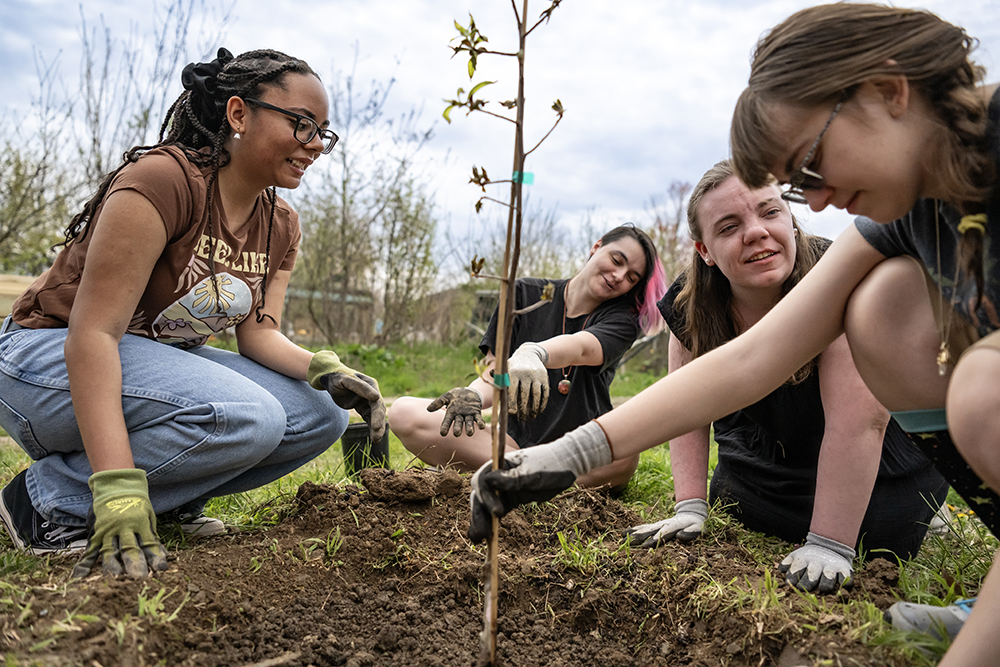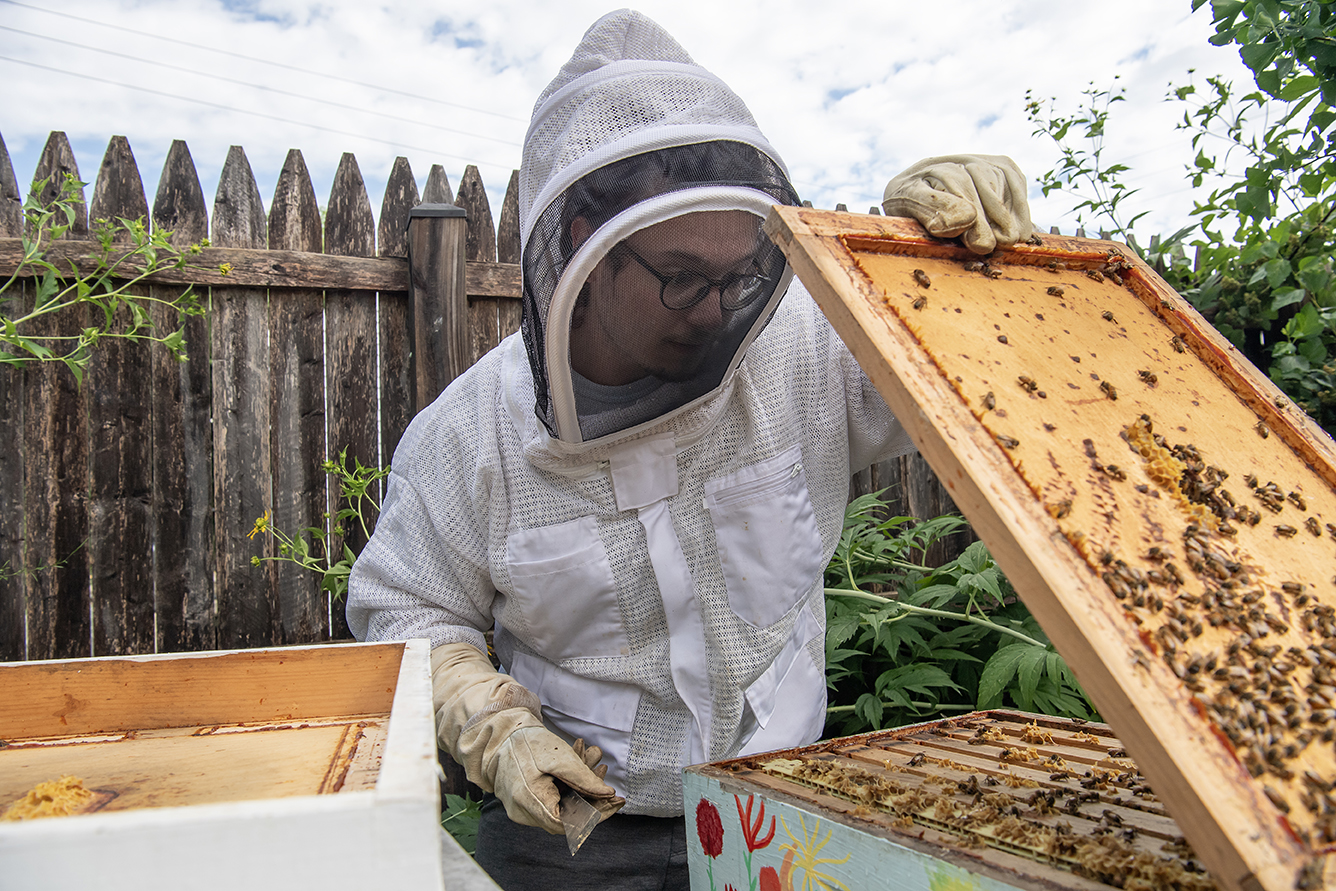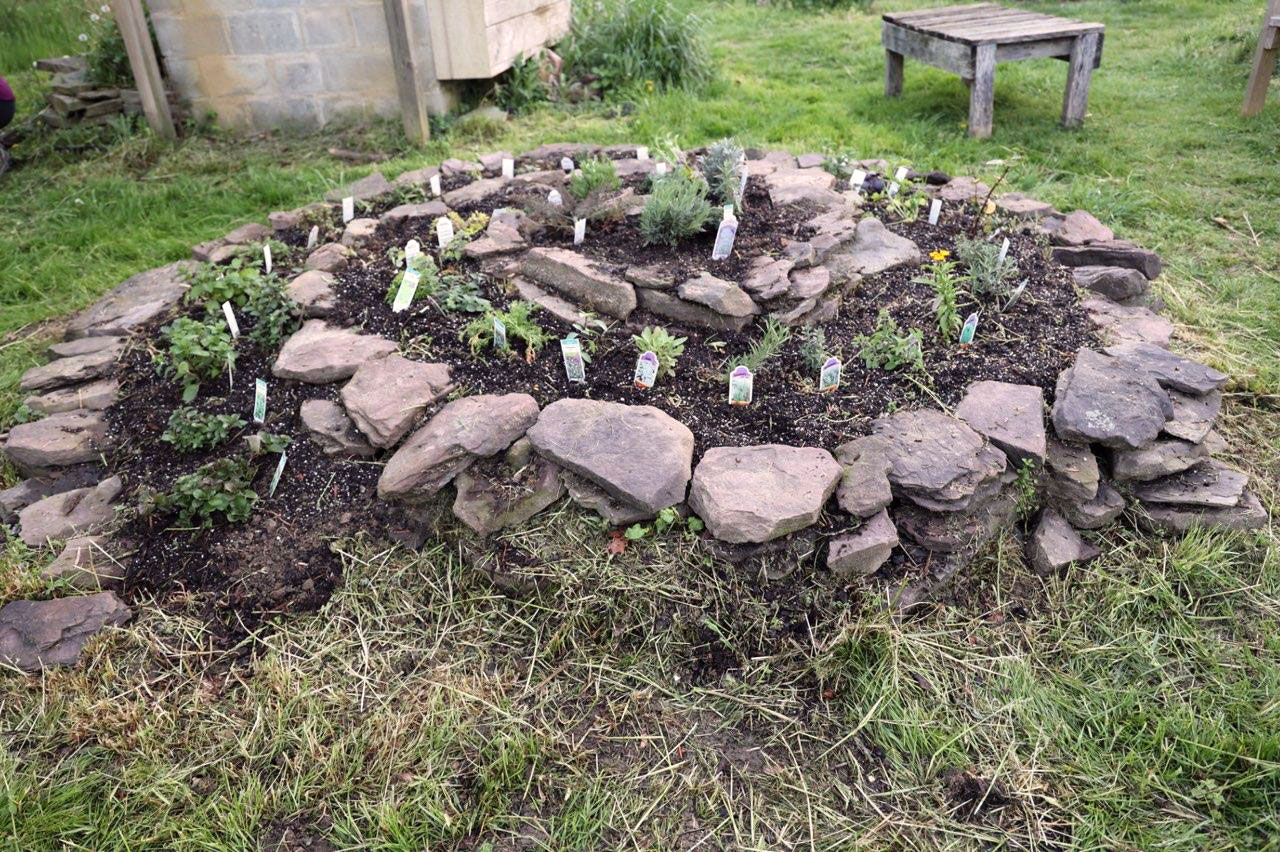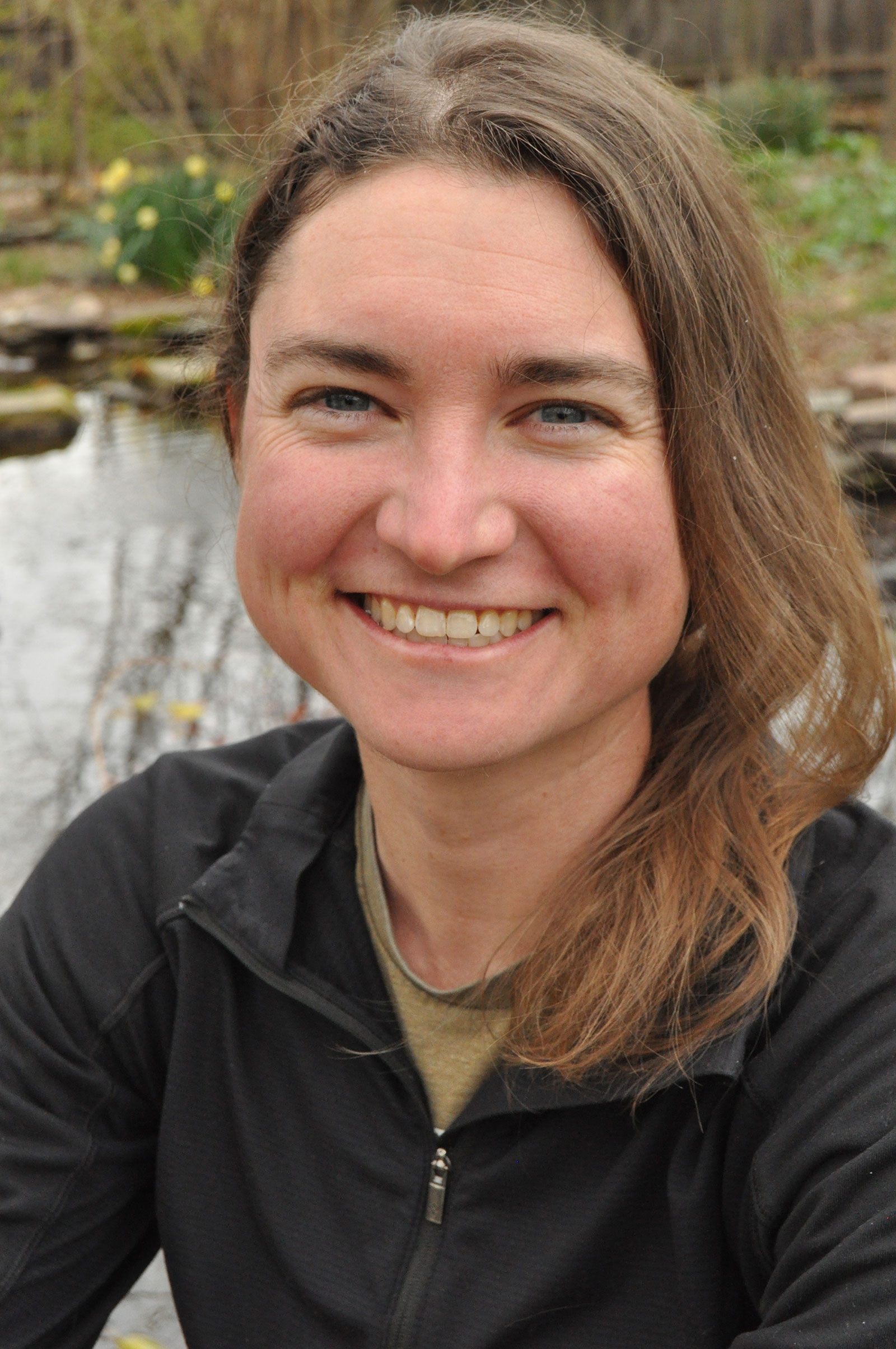Campus Garden
With more than a dozen fruit trees, an apiary for beekeeping, chicken council, herb spiral, an earthen oven, living roof, pond, and composting program, the Campus Garden is a flourishing sanctuary for wildlife and hands-on learning.

The Center for Environment & Society supports the activities of students to manage an edible forest garden that follows permaculture principles, supporting ecological vitality while producing food for people. Students cultivate a relationship with the natural world. And they acquire food & lifestyle skills that promote individual health and well-being.
Since its founding in 2012, the Campus Garden has flourished into one of the most dynamic and impactful organizations on campus. It serves as a hub for ecological research, internships, community engagement, and celebration.
ARTICLE I – NAME
The official name of this organization shall be the Washington College Campus Garden, herein referred to as the Campus Garden.
ARTICLE II – MISSION
The Campus Garden exists to cultivate an edible forest garden rooted in permaculture design principles. These principles guide us in regenerating the land into a resilient ecosystem that also meets human needs. Through careful observation of natural patterns—such as how energy flows through ecological systems—we strive to work in harmony with nature rather than against it.
We partner with the Office of Lifelong Learning to explore sustainable food production methods that enhance nutrient density and address regional food insecurity. Additionally, the River and Field Campus (RAFC) outpost operates under the Campus Garden's jurisdiction. There, we are developing a food forest that offers habitat for wildlife, edible plants, and rich educational opportunities.
ARTICLE III – MEMBERSHIP
Section 1: Membership Eligibility and Responsibilities
Membership is open year-round. To retain voting rights, members must be part of the
club's GroupMe. Members are encouraged—but not required—to attend workdays, workshops,
or events based on their availability and interest.
All members are expected to uphold the Campus Garden as a safe, inclusive space. Discrimination of any kind or violation of our diversity and inclusion statement will not be tolerated. Members are also expected to honor the core permaculture ethics: Earth Care, People Care, and Fair Share.
ARTICLE IV – EXECUTIVE BOARD
Section 1: Officer Roles
Executive roles include:
- President
- Vice President
- Apiculturist
- Chicken Chancellor
A member may hold up to two positions, though it is generally recommended to serve in only one to ensure focus and effectiveness. Depending on student interest, additional officer positions may include:
- Outreach Coordinator
- Outpost Manager
- Compost Manager
- Ethnobotanist
- Pond Coordinator
Section 2: President
- Collaborate with the permaculture interns (if not serving as an intern).
- Lead weekly workdays to develop and maintain the garden.
- Organize campus-wide events.
- Coordinate closely with the club adviser on project planning.
- Develop and monitor the budget.
- Track purchases and finances.
- Meet with the Financial Controller as needed.
Section 3: Vice President
- Support the President in designing and executing projects and events.
- Lead workdays when the President is unavailable.
- Assist with budget planning.
Section 4: Outpost Manager
- Oversee field activities at the RAFC outpost in collaboration with the President.
- Maintain tools and supplies at both locations.
- Optimize forest food production.
Section 5: Ethnobotanist
- Study the functions and roles of plants in the Campus Garden.
- Maintain and expand the online plant database.
- Promote the integration of native and permaculture-friendly plants across campus.
Section 6: Compost Manager
- Coordinate composting initiatives on campus and at the garden.
- Lead programs focused on organic waste education.
- Serve as liaison between the Campus Garden and the Compost Team.
Section 7: Apiculturist
- Manage beekeeping operations at both the main garden and the RAFC outpost.
- Maintain Bee Campus USA certification.
- Partner with the Center for Environment and Society on pollinator education.
Section 8: Outreach Coordinator
- Connect the garden with educational partners, including local schools and farmers' markets.
- Facilitate the development of community gardens.
- Build collaborations with other campus organizations.
Section 9: Pond Coordinator
- Monitor the pond's health and ecological balance.
- Plan and advocate for ongoing maintenance.
- Lead workdays and coordinate pond-related projects.
Section 10: Chicken Chancellor
- Lead care and educational activities related to the chickens.
- Organize the Chicken Council to ensure daily needs are met.
- Conduct monthly health checks for each chicken.
- Monitor and manage food and supply inventory.
Section 11: Appointment Process
Officers will be selected annually, typically in March. Students may volunteer for
positions; voting will take place if multiple candidates are interested.
ARTICLE V – MEETINGS
Workdays will be held at least once a week in the Campus Garden or greenhouse, weather permitting. Additional opportunities may be offered based on officer availability. Members are encouraged to attend a minimum of three meetings per semester.
ARTICLE VI – BYLAW AMENDMENTS
Bylaws may be amended at any time to reflect the evolving needs of the Campus Garden. All members are welcome to propose changes, which will be reviewed by the Executive Board.
For an amendment to be adopted, a consensus must be reached among executive members. Once consensus is reached, the proposed change must be shared with members for approval. If concerns arise, the board will reconvene to revise and resubmit the amendment for member approval.
ARTICLE VII – INCLUSION AND DIVERSITY STATEMENTS
Permaculture Ethics and Principles
Our approach is grounded in the ethics and principles of permaculture, which guide
both our environmental stewardship and interpersonal interactions. We acknowledge
that many of these principles are rooted in Indigenous practices and traditions. Members
are encouraged to explore these ethics further at Permaculture Principles.
Non-Discriminatory Clause
In compliance with Title IX, the Campus Garden adheres to all policies set forth by
Washington College and applicable local, state, and federal laws. We do not discriminate
on the basis of race, color, national origin, sex, disability, religion, age, veteran
status, gender identity or expression, or sexual orientation.
The Campus Garden is a recognized organization with at least six full-time undergraduate members.
Animals - Create nectaries for beneficial insects, pollinator corridors, and habitat for bats, birds, reptiles, and amphibians; explore the inclusion of livestock in closed-loop systems.
Vibe - Grow an edible classroom and wildlife sanctuary that conveys a sense of tranquility, environmental renewal, and cultural reinvention.
Structures - Showcase low-impact, sustainable technology using natural and salvaged materials for cooking, food processing, teaching and learning spaces, and recreation.
Stormwater - Capture runoff from impervious services through the use of rain gardens, swales, ponds, cisterns, and soil infiltration techniques.
Fertility/Waste - Build soil by producing mulches and fertilizers through composted food waste and vegetation; cycle nutrients.
Food - Establish a mosaic of annual and perennial crop production infused with wild edibles in a multilayered forest garden; demonstrate educational models of useful nutrient-dense polycultures that thrive in the local foodshed; involve students in cooking, food processing, and preservation techniques.
Yields - Provide cutting-edge student learning and leadership opportunities in regenerative food production; host campus and community outreach workshops in gardening, cooking, wildcrafting, and natural building skills; develop fiscal self-sufficiency; create online profiles for useful plants featuring student-driven research; inspire permaculture sites across the region; redistribute surplus produce to community organizations in need.
The garden offers a tranquil, creative space for collaboration with groups such as the Academy of Lifelong Learning, Department of English, Department of Environmental Science and Studies, and Compost Club. Fall and Spring Break trips include camping and traveling across the country.
The UME Master Gardener program collaborates in the space to bring expertise and guidance to students of all ages.
Community partners include the Chestertown Garden Club, Lands End Farm, Lucky Pick Farm, the Bayside HOYAS, ShoreRivers, Mid-Shore Health Improvement Coalition, and New Grounds Composting.
Projects in the Campus Garden

Beekeeping
After an introductory class, students care for a hive of honeybees in the Campus Garden.

Herb Spiral
The herb spiral is one of the central points of the Campus Garden. It provides our community with not only medicinal and edible plants but a beautiful and relaxing sight. It was constructed to provide drainage for plants that need less water, which are placed at the top, and plants that need more water, which are placed at the bottom.
The herb spiral provides us with (from top to bottom):
- Bronze Fennel
- Lavender
- Hot & Spicy Oregano
- Rosemary
- Stevia
- Creeping Rosemary
- Variegata Oregano
- Golden Oregano
- Germander
- Catmint
- Italian Oregano
- Chamomile
- Cinnamon Basil
- White Sage
- Shady Acres Rosemary
- Sweet Marjoram
- Mexican Mint Marygold
- Arp Rosemary
- English Thyme
- Spearmint
- Italian Parsley
- Purple Sage
- Amethyst Basil
- Mojito Mint
- Staro Chives
- Everleaf Emerald Towers Basil
- Chocolate Mint
- Lemon Verbena
- Vietnamese Coriander
- East Indian Lemon Grass
- Strawberry Mint
- Kentucky Colonel Spearmint
- Peppermint
- Sweet Lemon Mint
- Orange Mint
Permaculture Principles
Permaculture is a philosophy and design strategy that seeks to align our lives with patterns in nature. It guides the mission and philosophy of the Campus Garden, a space all students can explore the connection between food and biodiversity.
Permaculture is a paradigm for human culture based on three ethics:
- Care for the Earth – replenish ecosystems on which we depend
- Care for People – meet human needs
- Fair Share – a balanced approach to diversity and inclusion

